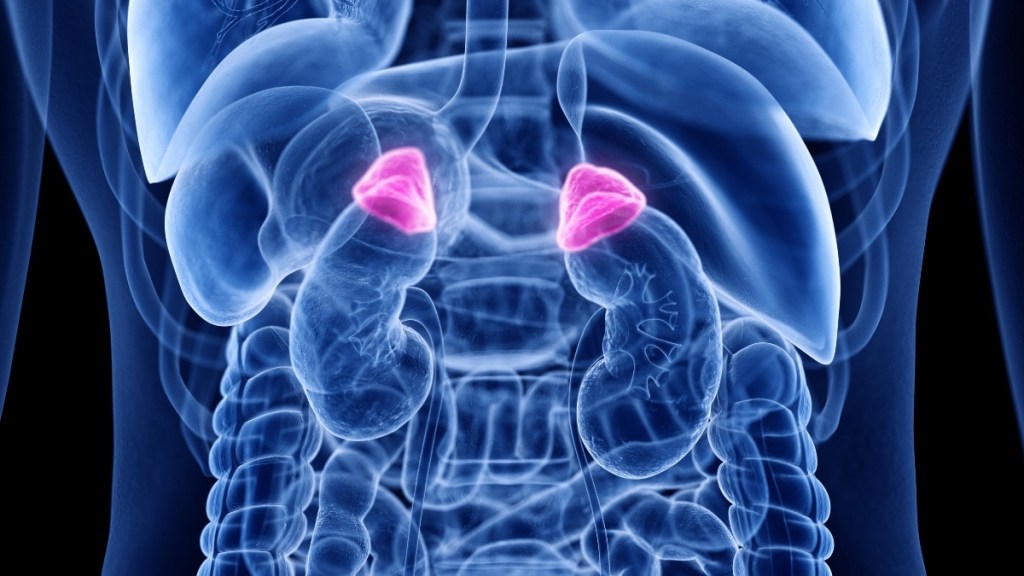Top Doctors: If You’re Stressed, Tired and Crave Salty Foods, It’s Time to Give Your Adrenal Glands Some TLC
7 study-proven ways to heal your adrenals naturally and rediscover calm, all-day energy

As little as five or 10 years ago, we may have chalked lagging energy and brain fog up to simply getting older. But now, experts know that’s not always the case. The true underlying cause of fatigue and mental fuzziness for many women is sluggish adrenal glands. And simply giving these hardworking glands a tune up can help you stay energetic, clear-headed and calm no matter how hectic life gets. Read on to learn about the critical role the adrenal glands play in the body, why they start to lag, and how to heal adrenals using simple at-home strategies.
What are the adrenal glands?
“The adrenal glands are small, triangular-shaped glands located on top of both kidneys,” explains adrenal health expert and integrative medicine physician Carrie Lam, MD, co-author of Advanced Symptoms of Adrenal Fatigue Syndrome. “They are small but mighty organs that play a pivotal role in the body by producing a range of essential hormones that regulate various bodily functions.” The glands biggest job is producing the stress hormone cortisol. Cortisol helps regulate metabolism, blood pressure, inflammation, and the body’s sleep-wake cycle, explains Dr. Lam.
The adrenals are also responsible for producing epinephrine and norepinephrine, hormones that regular the body’s fight-or-flight response, aldosterone, which controls electrolyte balance in the blood to maintain healthy blood pressure, and sex hormones like estrogen and testosterone. “Collectively, these hormones are vital for survival,” Dr. Lam says. “They help the body respond to stress, maintain homeostasis, and support various bodily functions.”

What is adrenal fatigue?
It’s important to note that the term “adrenal fatigue” does not always refer to the adrenal glands themselves getting tired. In fact, when someone has adrenal fatigue, also known as adrenal dysfunction, it means the glands’ cortisol production is out of whack. “Some people have high cortisol all the time and some have low,” says women’s health expert and certified OB/GYN nurse practitioner Marcelle Pick, MSN, NP, author of Is It Me or My Adrenals? “Some people are wired and tired and have an up and down ability to be active, while others wake up in the morning and have no energy. Everyone is different in terms of how they respond” when their adrenal glands aren’t working up to par.
What causes adrenal fatigue?
Why do the adrenal glands get thrown off? In a word: stress. “Today, we’re exposed to constant stress from the moment we get up,” says Pick. “We have a culture in which many people have high cortisol every day. Over time, this can contribute to high anxiety, suppression of the immune system, microbiome changes, and hormone dysregulation.” Pick says adrenal dysfunction also affects your mitochondria, the tiny “energy engines” inside cells, which can cause your energy levels to dip.
When your stress levels are high and the body is in a constant state of fight or flight, the body begins funneling cholesterol to the adrenals. There, it’s used for cortisol production at the expense of the production of other vital hormones. This leads to imbalances in a wide variety of systems, setting off a chain reaction of symptoms. “Symptoms attributed to adrenal fatigue can be broad and far-reaching,” notes Dr. Lam.
The most common symptoms of adrenal fatigue
- Anxiety
- Energy swings
- Sluggishness
- Weight gain or difficulty losing weight
- Low blood pressure
- Low blood sugar
- Cravings for salty or sugary foods
- Irritability
- Nausea
- Brain fog
- Frequent colds
- Sleep disturbances
- Heart palpitations
How to test for adrenal fatigue
The good news is that you can get cortisol levels back into balance, Pick assures. The first step is finding out where you stand. To determine if you have adrenal fatigue, a four-point salivary cortisol evaluation is recommended. “Cortisol is supposed to be high in the morning and low at night,” Pick adds. “Just one reading doesn’t help us evaluate if the person has adrenal dysfunction.” Testing four times over the course of a day — often in the morning, around noon, in the late afternoon and before bed — helps determine whether your adrenals are over- or under-producing cortisol.
There are tests available today that you can do at home and receive the results in just a few days. One to try: myLAB Box Adrenal Stress Test (Buy from myLab Box, $149), which can be paid for using an FSA or HSA card. Once you know you the glands need a boost, our experts say it’s easier than you may think to heal your adrenals.
Tip: Not ready to invest in a test kit? Check out Dr. Berg‘s video below to learn how to do a home blood pressure screening known as the Ragland’s Test that could clue you in to potential adrenal fatigue.
How to heal adrenals naturally
Taming adrenal-sapping stress and recharging worn-out glands can dramatically improve your energy and focus. Here, seven expert-recommended tips that help you heal your adrenals in no time.
1. Add this B vitamin
Vitamin C as well as B vitamins, especially vitamin B5 (or pantothenic acid), are critical for healthy adrenals, says Dr. Lam. Aim for 75 mg. of vitamin C daily, either through food sources such as kiwi, broccoli or bell peppers, or a supplement. And Vitamin B5 in particular has been shown to enhance adrenal function and heal sluggish adrenals. A study in the Biological & Pharmaceutical Bulletin found that folks who were given pantothenic acid had higher levels of adrenal hormones and had higher adrenal sensitivity to stressful situations. You can get the benefits by taking 200 to 400 mg. of pantothenic acid daily. One to try: Nature’s Way Pantothenic Acid (Buy from iHerb, $10.89).
2. Take ashwagandha
After first supporting the adrenals with vitamin C and vitamin B5, considering adding ashwagandha to your daily routine. “Adaptogenic herbs like ashwagandha have been around for thousands of years,” says Pick, who recommends it for people with high cortisol. These herbs improve your body’s ability to respond to stress. Ultimately, this levels out cortisol production to increase energy during the day and improve sleep at night. That makes it one of the best natural ways to heal your adrenals.
Plus, a study in the journal Phytomedicine found that ashwagandha has anxiety-easing power similar to the prescription anti-anxiety drug Ativan. Take 100 to 500 mg. per day to get the benefits. Most experts recommend taking ashwagandha about an hour before bed. One to try: Life Extension Optimized Ashwagandha (Buy from Life Extension, $6.75.) (Tip: Prefer smoothies to supplements? Click through to learn why powdered ashwagandha makes a great addition to adrenal cocktails.)
3. Fill up on protein
“When you have adrenal dysfunction, you need protein for breakfast,” Pick says. “Then, at each meal, eat your protein first before carbohydrates.” What makes protein so important? Chronically high cortisol levels can lead to reduced muscle mass and increased appetite, both of which can be counteracted by keeping your protein intake high. Indeed, a study in the journal Heliyon found that a low-protein diet during times of stress reduces adrenal function and triggers fatigue, whereas a high-protein diet nourishes adrenals and keeps energy up. Try enjoying a veggie scramble or Greek yogurt with fresh fruit to start the day. (Click through for the best recipes using vanilla protein powder, and to see more cortisol-lowering foods.)

4. Sip tulsi tea
Trading your black tea for an herbal brew made with adaptogenic tulsi, or holy basil, helps your body better respond to stress. A study in Frontiers in Nutrition suggests drinking tulsi tea twice daily significantly reduces stress, lowers your heart rate and even improves sleep. And in a separate study in Evidence-Based Complementary and Alternative Medicine, folks who sipped tulsi tea daily cut their stress response in half after four weeks. Plus, they saw their levels of chronic exhaustion plunge up to 78% after six weeks. (Click through for more holy basil health benefits.)
5. Place a hand on your heart
“Stress reduction techniques such as meditation, yoga and deep breathing exercises, as well as taking time for daily relaxation and hobbies that reduce stress, are often recommended for supporting adrenal health,” says Dr. Lam. That said, more important than choosing a strategy that other people suggest is finding one that you enjoy. “You have to find something that you like, otherwise you don’t do it,” Pick says. “Anything that helps you get out of that state of panic, that high state of arousal, can be beneficial.”
One trick to try: When you’re tense, place your hand over your heart and focus on taking slow, deep breaths. Focus on the feeling of oxygens entering your lungs and the warmth of the your hand. A study in Comprehensive Psychoneuroendocrinology found this type of self-soothing touch lowers your fight or flight hormones even faster than receiving a warm hug from a loved one. (Click through for an easy 5-minute mindfulness meditation that will help dial down stress.)
6. Go for a stroll
Walking may very well be your preferred stress reliever. And if it is, you can get double the benefits. A study in the Scandinavian Journal of Medicine & Science in Sports suggests a leisurely 30 minute midday stroll is enough to reduce stress and increase positivity for the rest of the day. Plus, Dr. Lam recommends regular, moderate exercise like walking as a way to rebalance hormone production.

7. Savor sweet potatoes
For people with adrenal fatigue, their glucose levels are already somewhat dysregulated, notes Pick. That’s why she recommends choosing foods rich in complex carbs and fiber, such as sweet potatoes, winter squash, and whole grains. She also advises skipping foods like pasta, white potatoes and processed carbs. This balances your blood sugar levels to limit energy and mood swings. And don’t shy away from these better-for-you carbohydrates: A study in the journal Nutrients found that among people following a healthy, whole-food diet, those who consumed the most carbohydrates in the form of whole grains, vegetables and fruit had the lowest levels of cortisol. (Click through for more health benefits of sweet potatoes.)
For more ways to heal your adrenals:
If You Feel Tired & Crave Salty Snacks, Your Adrenal Glands May Be Worn Out
The Adrenal Reset Diet Cycles Carbs to Help You Lose Weight
9 Best Supplements for Adrenal Fatigue
This content is not a substitute for professional medical advice or diagnosis. Always consult your physician before pursuing any treatment plan.













